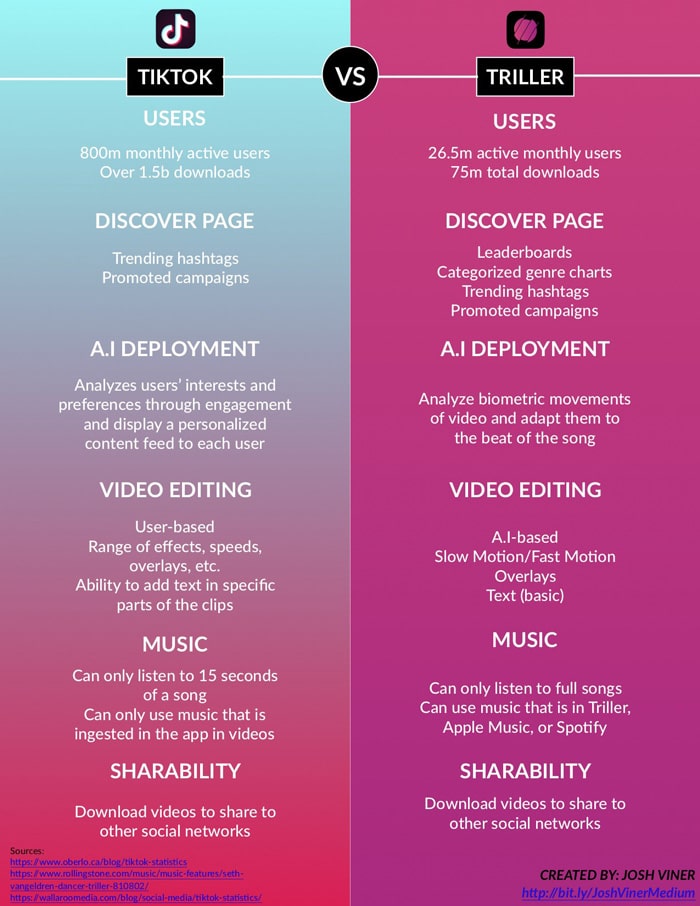What is the app Triller and will it replace TikTok? Everything you need to know about both apps
As the TikTok saga continues to unfold, with President Trump banning the app in the US and Microsoft interested in buying it, many users are starting to realise the risk that the video-sharing app might represent when it comes to their data privacy. But the controversy brings one more problem to light: what are we going to do without TikTok? That’s where Triller comes in to save the day.
What is Triller?
Initially released in 2015, the LA-based video-sharing app Triller has recently shot to number one in the app store in 50 countries. Similar to TikTok—so much so that people call it ‘the new TikTok’—Triller is a video-sharing platform where music is an integral part of the process. Triller’s CEO Mike Lu launched the app with the goal of “finding the next Justin Bieber or Chris Brown.”
While TikTok started as Musical.ly, a lip-syncing app that was extremely popular among pre-teens, Triller came on the market with a bang. The 3 biggest music companies (Sony, Universal, Warner) are all invested in the app, and so are dozens of artists (including The Weeknd, Lil’ Wayne and Kendrick Lamar). Co-owner of Triller, Jaeson Ma told The Hustle that some artists have compared the two apps and said: “TikTok is America’s Got Talent. Triller is MTV.”
The “music video maker app”, as it is described on Triller’s website, has shot to number one in the app store in countries such as the US, Australia, France, Britain, and Italy.
What are the differences between TikTok and Triller?
Like TikTok, Triller lets you record yourself lip-syncing or performing a song. The main difference is that the platform’s editing algorithm edits videos for you using “intelligent audio and facial analysis to decide when to cut.”
TikTok’s AI specialises in search and recommendations whereas Triller’s AI ‘edge’ is its ability to seamlessly edit music with videos and photos. Triller also integrates music players like Apple Music into the platform, which means that every time an artist’s song is played, it counts as a stream and the specific artist gets paid just like they do on Spotify. The real difference between TikTok and Triller lies in the fact that Triller appears to have its sight set on working with the music industry.
Furthermore, Triller’s ‘Discover’ pages are somewhat different from TikTok’s. Triller categorises its Discover page with ‘Leaderboards’, genre categorisation, promoted campaigns, and top videos. TikTok, on the other hand, displays trending hashtags, top videos, and promoted campaigns. The challenges that are promoted on Triller’s Discover page are almost always from hip-hop artists, whereas TikTok doesn’t seem to favour any specific musical genre.

Who are the celebrities using Triller?
As another competitor in an increasingly crowded industry, Triller decided to join in on the action with the help of some major players. Started by app developers David Leiberman and Sammy Rubin (also creators of Disney Frozen: Karaoke), Triller later brought on award-winning music video director Colin Tilley who has previously worked with Kendrick Lamar, Justin Bieber, Nicki Minaj, and more.
In early 2019, Chance The Rapper, Cardi B and Chris Brown started posting on Triller. Because of the deals the app put in place with specific music labels, the videos could be shared without being taken down. From there, Triller’s content started making a name for itself around the internet.
According to Ma, Triller hasn’t “spent a dollar on marketing or influencer acquisition. We are a platform for artists. We empower artists to get their brand out in a way that is authentic to them. And that’s why they all post for free on the platform.”
Who are the TikTokers that left the platform for Triller?
At the very end of July 2020, after months of TikTok controversy, Josh Richards, Griffin Johnson, Noah Beck, and Anthony Reeves announced they were leaving TikTok over security and privacy concerns.
The four influencers initially rose to fame as members of TikTok collective Sway House. After announcing that they would be leaving the app, the TikTokers asked their combined following of 50 million followers to join them on Triller instead.
According to the Los Angeles Times, Josh Richards, who now has more than 250,000 followers on Triller, will act as chief strategy officer. Noah Beck, Griffin Johnson, and Anthony Reeves have signed on as investors and equity shareholders. However, even after this announcement, all four influencers have since then continued to post on TikTok.
Is Triller the end of TikTok?
While Triller certainly looks like it could become the next TikTok, other TikTokers such as Dixie D’Amelio, who has 32 million followers, and Addison Rae, who has 53.3 million followers have remained ‘loyal’ to TikTok and only urged their followers to follow them on Instagram and YouTube instead if something were to happen to the Chinese-owned app.
India has already banned TikTok from the beginning of July. Meanwhile, lawmakers in Japan are currently pushing to ban the app, while politicians in Australia and the UK are considering similar measures.
What’s next for Triller?
While Triller’s initial focus is music, the platform also hosts TikTok-type content of all sorts: comedy, cooking, fitness. Speaking about the next few steps for the growing platform, Ma said: “With our recent acquisition of Halogen Networks, Triller is expanding into more live and premium content that is exclusive to the platform.[…] Along with Eros Innovations, we closed a deal to have Triller be the home for the comeback fight between Mike Tyson and Roy Jones Jr. The bout is scheduled for 12 September and you can watch exclusive training videos on Triller in the lead-up to the PPV date.”
Triller has also gained significant new investors from the music industry, including Snoop Dogg, important managers and other notable industry executives. The app has reported a 500 per cent month-over-month growth and reached in July 2020, 55 million active monthly users and 8 million active daily users around the world, according to Forbes.
As we’ve seen with many other social media and video-sharing platforms—remember Vine?—only time will tell how Triller will play out. While we await the verdict on TikTok’s data privacy issues, perhaps it is time for us to move on to the next big thing and create a Triller account. As we’ve explained previously, it looks like Triller won’t be such an extreme change from TikTok.






